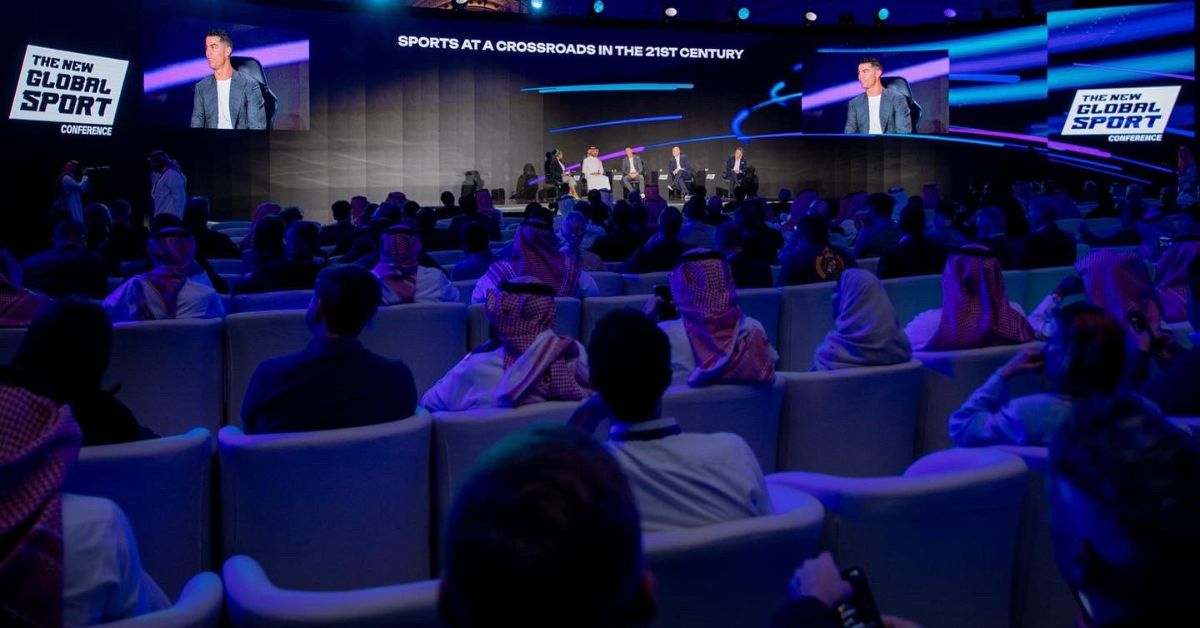RIYADH — Once a niche subculture, esports has transformed into a global sensation, captivating audiences and players with its thrilling mix of skill, strategy, and entertainment. In Saudi Arabia, a country known for its fervent passion for sports and technological innovation, esports has risen as a dynamic force set to reshape the competitive gaming arena.
The Electronic Sports World Cup, the world’s premier event of its kind, was unveiled by Saudi Crown Prince Mohammed bin Salman and will be hosted annually in Riyadh starting in the summer of 2024.
Esports tournaments will play a pivotal role in realizing the strategic goals of the gaming and esports sector, aiming to contribute over SAR 50 billion (US$13.3 billion) to the gross domestic product by 2030.
The tournament will take place in indoor venues, complemented by a plethora of activities and events. It presents a unique opportunity to draw a fresh wave of visitors intrigued by the electronic gaming sector, thereby boosting Riyadh’s tourism during the summer months.
Simultaneously, 67 percent of the Saudi populace engages in electronic gaming, and the industry is projected to offer 39,000 job opportunities.
The Esports World Cup is the natural next step in Saudi Arabia’s journey to become the premier global hub for gaming and esports, offering an unmatched esports experience that pushes the boundaries of the industry. The competition will enhance our progress towards realizing the Vision 2030 objectives of diversifying the economy, growing the tourism sector, creating new jobs in various industries, and providing world-class entertainment for citizens, residents, and visitors alike.
Saudi Crown Prince Mohammed bin Salman
The Saudi Crown Prince also unveiled the creation of the Electronic Sports World Cup Foundation. This nonprofit entity will oversee the tournament and act as the catalyst propelling this sector into a new era of collaboration among all partners and stakeholders in the gaming and esports ecosystem.
While officials haven’t yet detailed the specific games for the World Cup competition, they plan to announce them early next year. However, they did hint that the tournament would feature the most popular games across all genres and would boast the “largest prize pool in esports history,” according to the statement.
Last year, Prince Mohammed bin Salman unveiled a $38 billion investment strategy for the “Savi” group, linked to the Public Investment Fund. This strategy aims to generate 39,000 esports-related job opportunities by 2030.
The Kingdom’s officials have set their sights on transforming Saudi Arabia into a haven for game developers. Their vision is to produce games that “showcase Saudi and Arab culture,” as outlined in the national e-sports strategy. The goal is to roll out 30 globally competitive games, developed in local studios, by 2030.

The inaugural E-Sports World Cup is slated for next summer, taking the place of the eight-week “Gamers 8” e-sports tournament festival, which boasted a prize pool of $45 million this year.
Infrastructure and facilities
Saudi Arabia’s commitment to esports is evident in its substantial investments in cutting-edge infrastructure. Across the country, purpose-built arenas equipped with the latest gaming tech have been established.
These venues serve as epicenters for tournaments, events, and training sessions, nurturing a thriving community of budding esports enthusiasts. Such infrastructural developments not only raise the bar for competition but also enhance Saudi Arabia’s reputation in the global esports arena.
Acknowledging the viability of esports as a career, educational entities in Saudi Arabia are now introducing programs and courses tailored to competitive gaming. These programs are designed to refine players’ abilities and offer a holistic view of the diverse esports landscape, encompassing aspects like management, marketing, and event planning. Consequently, Saudi Arabia is grooming a fresh wave of esports talents ready to make their mark internationally.
Esports is revolutionizing the entertainment and leisure sectors in Saudi Arabia, spurring economic expansion. The growing demand for gaming hardware, software, and merchandise has paved the way for local enterprises to tap into this lucrative market.
THE NUMBER GAME * Esports to contribute US$13.3 billion to Saudi Arabia's GDP by 2030. * 67% of Saudis engage in electronic gaming. * Esports sector projected to offer 39,000 job opportunities. * $38 billion investment strategy for the "Savi" group. * Aim to produce 30 globally competitive games by 2030. * "Gamers 8" e-sports tournament had a prize pool of $45 million. * Global esports viewership reached 532.0 million in 2022. * Esports fans projected to total 640.8 million by 2025. * Esports revenues hit US$1,136.5 million in 2021. * Esports revenues expected to reach US$1,866.2 million by 2025.
Furthermore, the allure of esports events and tournaments, both online and offline, generates substantial revenues via advertising, sponsorships, and ticketing. This economic uptick underscores the industry’s promise as a long-term growth and diversification catalyst.
The ascent of esports in Saudi Arabia, while remarkable, is accompanied by its set of challenges. Regulatory structures, nurturing talent, and ensuring accessibility are areas that require ongoing focus and enhancement. Yet, with a lucid vision and a committed cohort of players, event organizers, and aficionados, the trajectory of esports in the Kingdom is undeniably bright.
Esports globally
The global esports landscape has witnessed a phenomenal surge since 2016. The audience base, encompassing both casual viewers and ardent fans, has expanded significantly. From 2018 to 2019, there was a growth spurt of 12.3 percent. Newzoo’s revised figures for 2019 indicate that a whopping 397.8 million individuals tuned into esports, either as regular viewers or occasional spectators. This upward trend persisted through 2020 and 2021.
In 2022, the esports viewership reached an impressive 532.0 million, split between 249.5 million casual viewers and 240.0 million dedicated enthusiasts.
Newzoo’s forecasts suggest that the number of esports aficionados will grow at a CAGR of 8 percent from 2020 to 2025. They project a rise to 322.7 million casual viewers, with an additional 318.1 million being hardcore esports fans, culminating in a total of 640.8 million.
The revenue trajectory in the esports domain has been notably positive, especially in the post-Covid era. As per Newzoo’s data, the annual esports revenues touched US$1,136.5 million in 2021 and escalated to US$1,384 million in 2022, marking a year-on-year growth of 16.4 percent.
China is poised to be a significant contributor to global esports earnings, with Newzoo estimating that over a third of the worldwide esports revenue will originate from the country.
From 2020 to 2025, the esports sector is projected to amass revenues amounting to US$1,866.2 million, translating to a CAGR of 13.4 percent.








